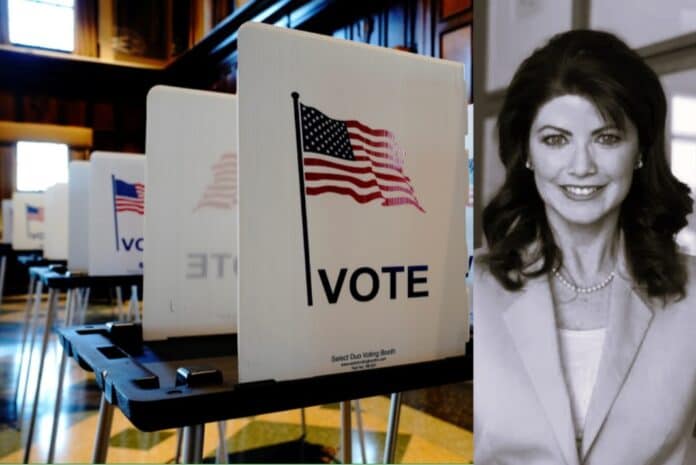By: Rebecca Kleefisch
We have a lot to be proud of. But while voters enjoy cookouts and fireworks this summer, we should not rest on the statewide ballot victories of April or even the local election wins. Activists need to work tirelessly and preach endlessly about the lessons learned in spring. I want to share what we learned because if we are not in a posture of constant improvement, the conservative movement will not improve win rates…and we must.
As the president of the 1848 Project, which recruits, trains, and does continuing education for local candidates like school, county, and municipal board members, I was incredibly proud of our candidates’ win rate: nearly 70% declared victory in their April 2 elections. I want to reiterate: I am so proud of our win rate, our candidates, and the work ethic that got conservatives over the finish line in April. But the lessons we took away from spring were not about the wins but the preventable losses. We learned three big things, and rather than share them exclusively with 1848 Project candidates and electeds, we want to share with a broad conservative activist audience in the hope that you will use what we learned, too. Big conservative wins are not delivered on the wings of gatekeeping, tribalism, and infighting. We must collaborate and share insights and knowledge. So, share with your friends who want to win.
1. Don’t Count on Good Election Day Weather Conditions
Let me set this up first. We observed three big factors affecting voter turnout on April 2: the weather, a motivated Democrat primary vote, and the impact of referenda and constitutional amendment questions on the ballot. It is not a secret that conservative and center-right voters favor “day of” voting. It is also not a secret that the traditional conservative and center-right voter in April elections tends to be of an older demographic. Not a secret, either: Wisconsin weather is unpredictable. On April 2, a massive snowstorm hit. While younger voters may not have been deterred by foul weather, older conservative voters, knowing their presidential primary victor had already been determined and that poor conditions were dangerous, may not have felt the same urgency to get to the polls. As a result, some of our candidates in areas like Eau Claire, La Crosse, Kenosha, and Waukesha counties suffered narrow– in some cases 2-digit– losses that serve as bitter reminders that every vote matters. Don’t expect the weather in November to be gorgeous. Prepare now.
2. If We Have a Voter Motivator, They’ll Find One (or 90) Too
One might assume conservatives would have had the upper hand in April turnout. Two election integrity constitutional amendment questions appeared on the ballot, a key motivator for conservative voters. Not to be outdone, though, 90 local referenda also appeared on the ballot across Wisconsin. When it comes to increased government size and spending and the referenda to make it reality, liberals were only too happy to see their voters storm the polls to grow spending and bureaucracy. While conservatives had two ballot questions, liberals asked 90. The comparison of statewide questions and local ones is apples to oranges, to be sure, but the point is that, if our team rallied voters statewide, their team was willing to do it in 90 separate local cases. Be prepared to motivate voters more than the other side.
3. Use Existing Law to Our Advantage
Finally, Democrat presidential primary voters were bizarrely motivated. Their nominee was as cemented as the Republicans’, but young progressives drove turnout up as much as 10% in some counties to ‘send a message’ to Joe Biden. These voters wrote “uninstructed” on their presidential primary ballots to show Biden that he was not anti-Israel and pro-Hamas enough, and they were willing to brave the snow to do it. While they were in the voting booth, they likely also voted for a bigger local government referendum, a liberal local government candidate, and against constitutional amendments to protect our elections.
Liberals will not change their aggressive tactics and fearlessness in getting to the polls. So, we need to do better. In order to combat a potential weather event and motivated liberal voters, conservatives must start taking advantage of early and absentee voting rules that are already law and used endlessly by the other side. And we must be consistent in our messaging about it. The RNC and the RPW have both promoted early and absentee voting as a way to compete more effectively. The narrow losses of April prove that it can be a difference-maker.
We must take the guesswork out of election night and start “banking” early and absentee votes. The greatest fear conservatives should have right now is not election night problems: conservatives with that fear should help administer the elections themselves by becoming poll workers and watchers to alleviate their own worries. They should recruit trusted allies across the state to do the same. In fact, the greatest fear conservatives should have right now is people not voting because they no longer believe in elections. When conservatives don’t show up to vote, there is no path to victory at all. Learn the lessons of April: get early and absentee votes in the door, work and watch the polls…and win.
Rebecca Kleefisch is the former Lt. Governor of WI and president of the 1848 Project.
Table of Contents











![Generation Gap [Up Against the Wall]](https://www.wisconsinrightnow.com/wp-content/uploads/2025/01/MixCollage-05-Jan-2025-10-32-PM-6058-356x220.jpg)




















